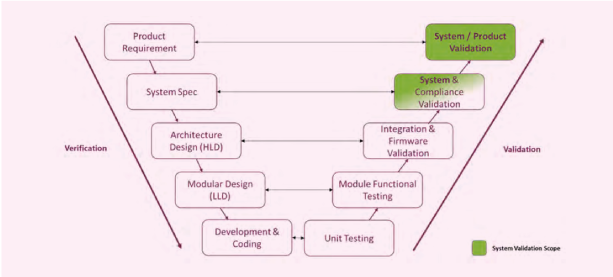System Validation, a step beyond simple product testing, is a comprehensive process ensuring a product meets its specified requirements and is also apt for its intended real-world application. This thorough method examines everything from the integration of hardware and software components to the user interfaces, focusing on their usability, accessibility, and intuitiveness. It's an approach that confirms a product's resilience and reliability by testing it under various conditions.
The V-model serves as a foundational structure in System Validation, offering a methodical approach to ensuring that each phase of product development aligns with corresponding testing stages. Originating from the traditional waterfall model, the V-model enhances the process by integrating validation activities into every step of product creation. This integration is crucial in System Validation, particularly for ensuring that new or first-in-category products meet both their specified requirements and the high-quality standards expected in real-world applications.
System Validation differs from other types of validation in its scope and depth. While unit validation might focus on individual components, and integration validation looks at the interaction between these components, system validation examines the end-to-end functionality of the entire product within its operational environment.

The stakes are high for companies racing against time to meet their launch timelines. The challenge isn't just in managing the intricacies of system validation—but in doing so quickly, efficiently, and effectively from the initial design phase through to the production of prototypes and the development of the validation apparatus. It requires a trusted partner who can manage the end-to-end validation process and someone who can bridge the gap between innovative concepts and market-ready products.
This is the niche that Quest Global has carved out for itself. With vast experience across various verticals in engineering, we serve as an indispensable ally to our clients. Our expertise enables clients to navigate the complexities of system validation for new products, ensuring that every launch is successful and commercially viable. Quest Global's multidisciplinary approach leverages cross-industry insights, ensuring that the solutions are tailored for success, adaptable, and future-ready.
Quest Global's extensive support plays a crucial role in enabling its clients to enter the market with groundbreaking products and enhance their brand's reputation. With a deep commitment to excellence, Quest Global ensures that every product is meticulously validated against the most rigorous benchmarks, equipping clients with the confidence to launch offerings that embody the quality and reliability customers associate with their brand. This dedication to preserving a brand's equity through exceptional UX standards is what sets up our clients for enduring success in the marketplace.
The significance of System Validation goes beyond the technical aspects, directly influencing consumer trust and brand perception. A well-validated product is more likely to align with user expectations, building brand loyalty. System Validation's continuous improvement cycle, which includes iterative testing, feedback collection, and enhancement, allows a product to evolve with technological advancements and shifting consumer needs, exemplifying a brand's commitment to excellence. System Validation enhances brand equity by serving as proof of a brand's dedication to quality and reliability, which is critical for maintaining customer satisfaction and a strong reputation. Conversely, inadequate system validation can lead to product failures, negative publicity, and a tarnished brand image, all of which can erode brand equity.
Attaining System Validation is a continuous endeavor that is particularly crucial for new products or those that are first in their category. This process necessitates a strategic approach to ensure that a product complies with its stated requirements and performs well under actual usage conditions.
Establishing Key Performance Indicators (KPIs) is a critical first step in system validation. These quantifiable measures objectively assess a product’s performance, quality, and user experience. For new or pioneering products, KPIs are especially important because they offer a clear framework to gauge success in uncharted territory. They help track progress, identify improvement areas, and ensure that the product aligns with the high standards expected by both the brand and its users.
The infrastructure for testing must be meticulously designed to simulate a range of real-world conditions under which the product will operate. This is vital in unveiling any potential issues that could compromise the user experience or product functionality.
Ingenious validation solutions are imperative when validating products that are the first of their kind. These products lack historical data or precedent, making the validation process more complex. In such cases, creativity in testing methods and willingness to develop new validation models that can accurately predict product performance are required. The process often involves creating custom testing environments and employing advanced technologies like AI and Machine Learning to simulate and predict a wide range of usage scenarios.
The Shift-Left approach, integrating testing and validation early in the development cycle, offers significant benefits, such as early issue detection and cost optimization, ultimately leading to a smoother development process and quicker market entry.
AI and Machine Learning are redefining system validation by providing predictive analytics and automated testing, thus enhancing the V-Model of system validation and offering sophisticated insights into potential system weaknesses and user experience improvements.

Head - Technology Office, Hi-Tech Vertical, Quest Global